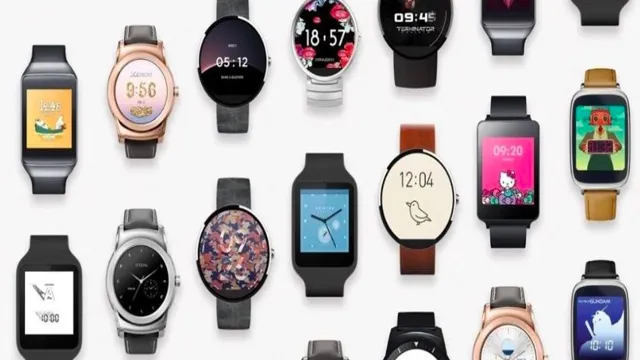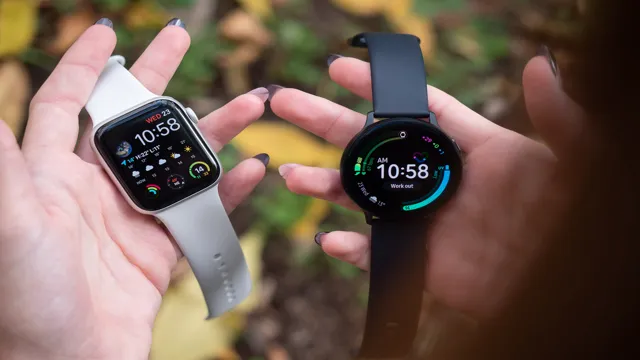Smart watches have become increasingly popular in recent years, with many individuals using them as an extension of their smartphones. These watches offer a range of features, from fitness tracking to messaging, making life more convenient for many. However, as with any technology, there are both pros and cons to using a smartwatch.
In this blog, we will explore the advantages and disadvantages of smart watches, helping you to decide whether they are right for you. So, grab a cup of coffee and read on to discover the pros and cons of smart watches.
Benefits and Drawbacks
Smart watches offer numerous benefits for tech-savvy individuals. They can display notifications, track fitness goals, and even make phone calls, all while being conveniently accessible from the wrist. However, there are also some drawbacks to consider.
One of the most significant is the battery life, which can range from a few hours to a couple of days depending on usage. Additionally, some people may find the small screen size frustrating, especially when trying to interact with apps or text messages. There is also a concern around privacy, as these devices collect a lot of personal data.
Overall, while there are some drawbacks to smartwatch technology, the convenience and functionality it offers may outweigh the negatives for many people.
Benefits:
Benefits and Drawbacks Every decision we make has its pros and cons. The same goes for every product or service we use. The benefits and drawbacks of using a product or service are essential factors to consider before making a decision.
The benefits of a product or service should outweigh the costs or drawbacks. When it comes to purchasing a product or service, we want to ensure that the benefits we will get from it are worth the investment. It’s important to read reviews, do research, and understand the features before making a purchase.
On the other hand, drawbacks should also be taken into account as it can help us make an informed decision about whether or not the product or service is suitable for our needs. When we weigh both the benefits and drawbacks of a product, we can make a sound decision that we will not regret in the future. Overall, it’s essential to consider both the benefits and drawbacks of a product or service before making any purchase.

– Convenience and Portability
When it comes to convenience and portability, there are certainly benefits and drawbacks. On the one hand, the ability to take your technology with you wherever you go is undeniably handy. Whether you’re streaming movies on a long flight or catching up on work emails while on vacation, being able to access your devices on-the-go is a huge plus.
However, with that convenience comes some potential downsides. For one, there’s the risk of losing your technology or having it stolen while out and about. Additionally, the smaller sizes of portable devices can often mean sacrifices in terms of processing power and storage capacity.
It’s important to weigh the pros and cons of convenience and portability before diving in headfirst. That being said, with the right precautions and considerations, the ability to take your technology with you can be a major game-changer.
– Health and Fitness Tracking
Health and fitness tracking has become increasingly popular, especially with the rise of wearable technology and fitness apps. One of the biggest advantages of tracking your health is having a clear understanding of your progress over time. By keeping track of your workouts, food intake, and daily activity levels, you can identify which habits are working for you and which ones need to be adjusted.
This helps you make more informed decisions about your health and can help you achieve your fitness goals more efficiently. However, tracking your health can also have some drawbacks. For example, it can become an obsession for some people, leading to unhealthy behaviors like over-exercising or obsessing over calorie counts.
Additionally, constantly monitoring your progress can become overwhelming and take away from the enjoyment of being active. Ultimately, the benefits of health and fitness tracking depend on how you approach it – as a tool for self-improvement or as an unhealthy obsession. With the right mindset and tools, health tracking can be an effective way to achieve your goals and live a healthier life.
– Communication and Connectivity
When it comes to communication and connectivity, there are plenty of benefits and drawbacks to consider. On one hand, we are more connected than ever before, able to easily communicate with people across the globe thanks to technology like smartphones and social media. This can be incredibly beneficial in both personal and professional settings, allowing us to stay in touch with loved ones and collaborate with colleagues regardless of location.
However, it’s important to remember that this constant connectivity can also have negative consequences. It can be difficult to disconnect and relax when we are always “plugged in,” and social media can create feelings of FOMO or comparison that can be harmful to our mental health. As with most things, the key is to find balance and use these tools in moderation to reap the benefits without succumbing to the drawbacks.
– Time Management and Productivity
When it comes to time management and productivity, there are certainly a number of benefits and drawbacks to consider. On the one hand, effective time management skills can help us to get more done in less time, leaving us with more opportunities for rest and relaxation. Additionally, having strong productivity habits can help us to achieve our goals, whether that be at work or in our personal lives.
On the other hand, there are certainly some disadvantages to consider as well. For example, if we become too focused on getting things done, we may neglect important aspects of our lives such as our relationships or our health. Furthermore, becoming too reliant on productivity tools and techniques can actually hinder our creativity and ability to think outside the box.
All in all, it’s important to strike a balance between productivity and relaxation, making sure that we’re staying on track with our goals while also taking care of ourselves and those around us.
– Entertainment and Customization
Entertainment and customization features are a centerpiece of modern technology. The abundance of customization allows you to tailor-make your device or software according to your preferences, making it an extension of your personality. At the same time, entertainment features open up new avenues for passing your free time.
You can play games, stream your favorite movies, listen to music, and so on. However, these amenities can carry some drawbacks. Over-reliance on entertainment may lead to addiction, wasting time, and discomfort.
Likewise, excessive customization can also lead to distractions, complications, and wasted time tweaking with device settings. It is advisable, therefore, to enjoy these benefits but use them in moderation. By creating a balance between these features and other aspects of our lives, we can relish the advantages while avoiding the negatives.
So, are you a customization or entertainment fanatic? How do you control yourself from getting too indulged in these features?
Drawbacks:
Smart watches have become increasingly popular in recent years due to their numerous advantages, such as being able to receive notifications, track fitness activities, and make phone calls without having to take out your phone. However, there are also some drawbacks to using a smart watch. One of the most significant drawbacks is that they can be quite expensive compared to traditional watches.
Additionally, the battery life of smart watches is not as long-lasting as that of regular watches. Some people also find the small screen size of smart watches to be challenging to navigate, and they can cause distractions when used for notifications during work or social settings. Lastly, some individuals may experience privacy concerns since smart watch manufacturers collect data about usage and movements.
Overall, while smart watches provide great convenience and features, it is important to weigh the pros and cons before deciding to invest in one.
– Battery Life and Charging Time
Battery life and charging time are perhaps the most significant drawbacks of modern-day smartphones. Although manufacturers are introducing larger and longer-lasting batteries, the majority of phones still require daily charging to run smoothly. This can be a major inconvenience for those who are frequently on the go and don’t have access to a charging port.
Furthermore, the charging time can be quite slow, with some phones taking several hours to fully charge. This can be frustrating for impatient individuals who need their phone to be available at all times. However, this issue can be partially resolved by using fast chargers or portable power banks to ensure that your phone doesn’t run out of juice when you need it the most.
– Limited Screen Size and Functionality
The limited screen size and functionality of devices can come with several drawbacks, especially when it comes to user experience. Smaller screens can make it difficult for users to navigate through pages, and functionalities may be limited as compared to larger devices. For example, some websites may not be optimized for smaller screens and may appear distorted or hard to read.
Additionally, some websites may require users to download an app, which may not be practical or space-consuming for smaller devices. However, some devices may offer voice assistants or gesture controls to mitigate these drawbacks and make the user experience more seamless. Overall, while smaller screens may have some limitations, newer technologies can help enhance the user experience and bridge the gap between smaller and larger devices.
– Cost and Compatibility
When it comes to cost and compatibility, there are a few drawbacks to consider when using certain software or tools. The first is obviously price, as some programs can be quite expensive and may not fit into everyone’s budget. Additionally, compatibility can be a challenge if the software you need is only compatible with certain operating systems or devices.
While this can be frustrating, it’s important to do your research beforehand to make sure the program you choose fits your needs and device specifications. Ultimately, it’s up to you to weigh the benefits and drawbacks of a program before making a purchase to ensure you’ve made the right decision for your needs and budget.
Conclusion
After weighing the pros and cons of smart watches, it’s clear that these devices have both advantages and drawbacks. On the one hand, they offer a practical way to stay connected, track fitness goals, and stay organized on-the-go. On the other hand, they can be expensive, distracting, and even detrimental to our health if used excessively.
In the end, the decision to invest in a smart watch will depend on your individual needs and preferences. It’s important to carefully consider the features and potential downsides before making a purchase. But hey, if you do end up jumping on the smart watch bandwagon, just remember to take breaks and give your wrist a rest every once in a while – after all, you don’t want to end up with a case of “tech neck” or “smart watch wrist”.
FAQs
What are the advantages of using a smart watch?
Smart watches offer several benefits, including the ability to track fitness goals, receive notifications and alerts, make calls and send texts without having to take your phone out of your pocket, and access apps right from your wrist.
Are there any downsides to using a smart watch?
While there are many benefits to using a smart watch, some people find them too distracting and prefer to disconnect from technology. Additionally, battery life can be a concern for some models, and they may not be as durable as traditional watches.
Can smart watches replace traditional watches?
Smart watches offer more functionality than traditional watches, but they may not be able to completely replace them for people who prefer the classic look and style of a traditional watch.
Can wearing a smart watch be harmful to your health?
There is currently no evidence to suggest that wearing a smart watch is harmful to your health. However, some people may experience skin irritation from the materials used to make the watch band, and extended use of the watch may contribute to eyestrain or headaches.


